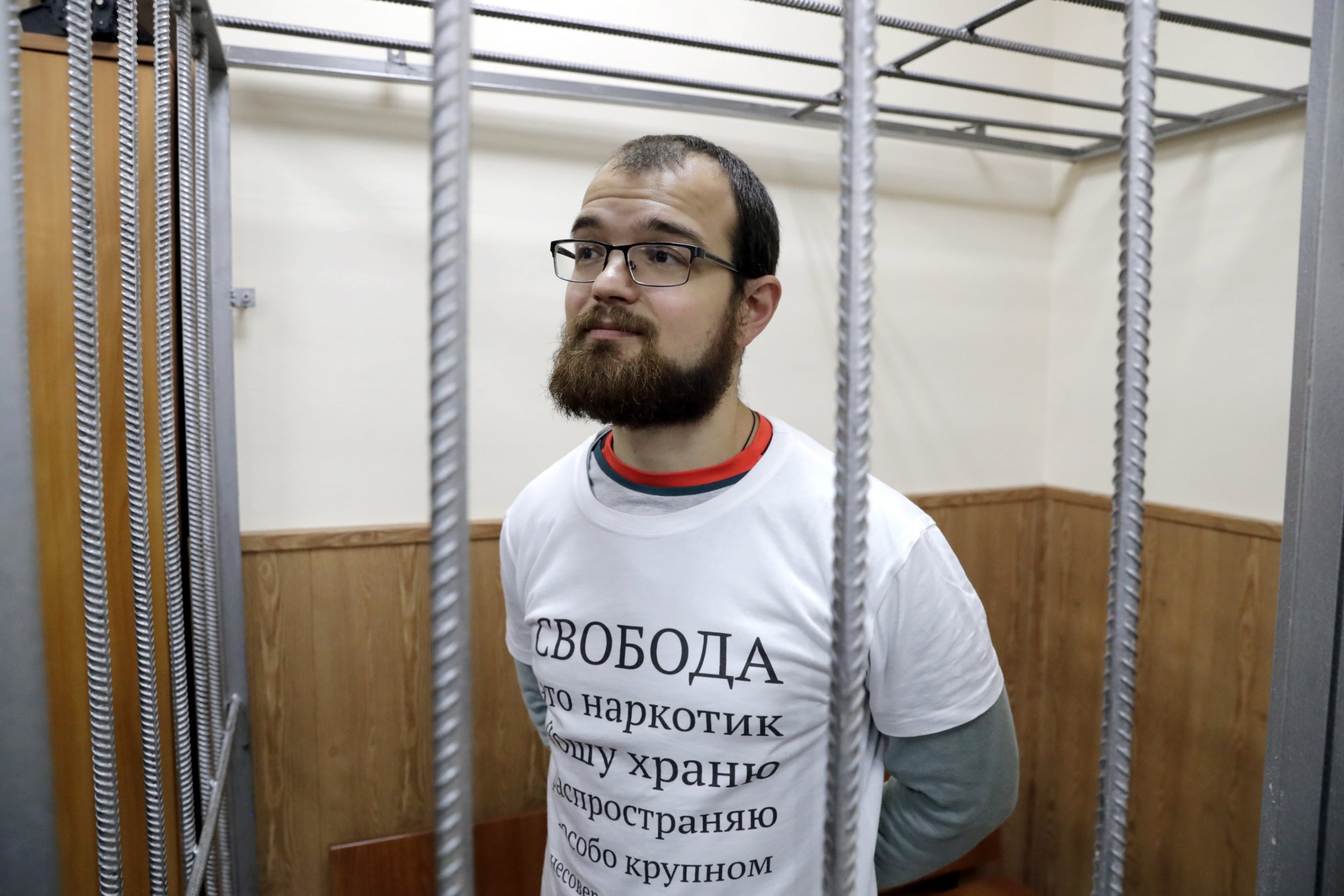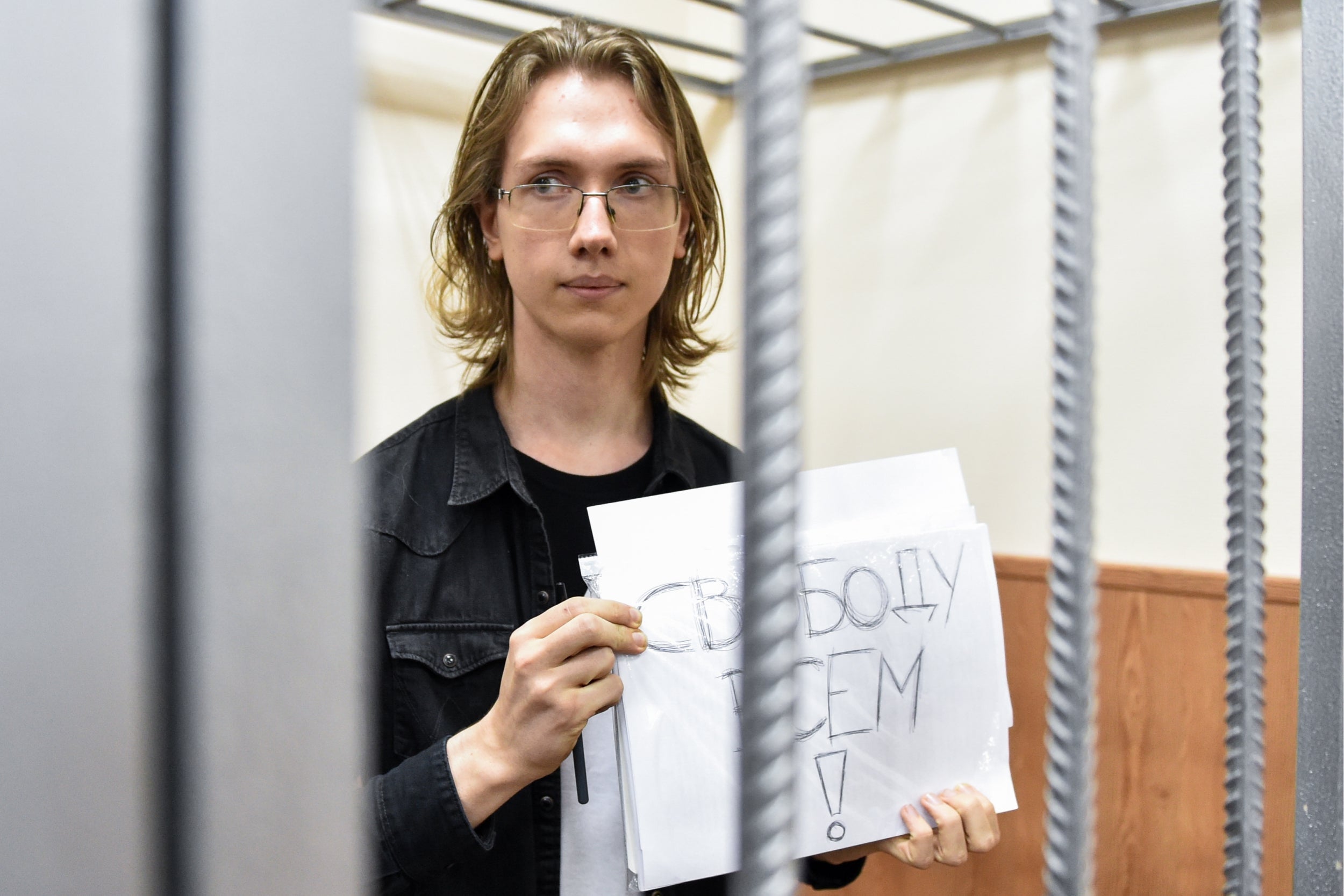Russia vs the kids: Authorities resume crackdown on protest generation
Summer of rallies pitched the Kremlin against a youth-led protest movement. After dialling down their operation, authorities seem to be renewing a clampdown, writes Oliver Carroll from Moscow


Your support helps us to tell the story
From reproductive rights to climate change to Big Tech, The Independent is on the ground when the story is developing. Whether it's investigating the financials of Elon Musk's pro-Trump PAC or producing our latest documentary, 'The A Word', which shines a light on the American women fighting for reproductive rights, we know how important it is to parse out the facts from the messaging.
At such a critical moment in US history, we need reporters on the ground. Your donation allows us to keep sending journalists to speak to both sides of the story.
The Independent is trusted by Americans across the entire political spectrum. And unlike many other quality news outlets, we choose not to lock Americans out of our reporting and analysis with paywalls. We believe quality journalism should be available to everyone, paid for by those who can afford it.
Your support makes all the difference.By the end of a summer of interrogations, 19-year-old Georgii knew what to expect.
The trick, he says, was to look for where the state investigator kept the presidential portrait: if Vladimir Putin was hanging directly above the desk, he was likely in for a difficult time.
“The worst was when the investigator had not only Putin but [defence minister Sergei] Shoigu too,” says the first-year medical student, who asked that his surname be withheld for security reasons. “That was four whole hours of hell.”
Georgii was one of 1,300 mostly young people arrested at opposition protests on 27 July. At the start, protesters had focused on the narrow issue of gerrymandering in elections to Moscow city council. But over the next few weeks, protests evolved to become the biggest test of Vladimir Putin’s authority since 2012.
They also became a test of the regime’s hardline resolve: how much it was ready to wage war on its kids.
In the weeks that followed 27 July, Georgii was served a typical menu: phone calls, home visits by police, threats of conscription and worse. He found his name on databases, at the job centre; even his orthopaedic consultant had somehow found out about him attending a protest.
“Everywhere I went I was asked who was paying me,” he says. Georgii’s case never moved on to charges. But friends and two dozen others were not so fortunate.
Most of these young men put on trial – police left the girls alone – were fringe actors in the protests. In many cases, CCTV recordings indicated defendants were themselves the victims of police brutality. None of it mattered during the often wild sentencing. One man received five years for sending a tweet. Another got four years for the repeated “crime” of attending an unsanctioned protest.

Following public outcry, authorities dropped half a dozen of the most egregious cases. The Kremlin was also famously forced to intervene in the case of 23-year-old actor Pavel Ustinov, imprisoned for allegedly resisting arrest. The judge had previously ruled video evidence showing his innocence to be inadmissible. Following street protests, his sentence was commuted.
Alexei Minyailo, 34, an aide to the opposition politician Lyubov Sobol, was one of the men who was released from a criminal investigation.
Dismissing the charges against him as “absurd” – he was accused of attending a protest he did not attend – he nonetheless considers the U-turn to be significant. It was reflective of a split among even the most loyal of law enforcement officials, he says.
“Everyone I spoke with understood that catching protesters is not real work,” he tells The Independent. “They went into the job to catch criminals. Not to examine videos to see who might have accidentally brushed against a police officer.”
By late September, it seemed the operation against protesters was finally being dialled down.
But then, last week, the arrests resumed.
On 14 October, two and a half months after the 27 July protest, Russia’s Investigative Committee announced that it was pressing charges against four men for allegedly assaulting police officers. A further two suspects were at large, it added.
One of the young men to be detained after dawn raids was Andrei Barshai, a 21-year-old physics student.
All we can look forward to is fear, desperation and hopelessness
Barshai had, it appears, made the mistake of putting his skinny body between a truncheon-wielding police officer and a protester, Boris Kantorovich, who was profiled in an earlier Independent article. In the opinion of state prosecutors, his behaviour was considered a violent assault commensurate with up to two years in prison.
His mother, Yelena Barshai, says there was no way the officer was put in harm’s way, describing her son’s conduct as an “emotional outburst” from a boy with an “acute sense of injustice.”
“Andrei was a good student, with a place at the Moscow Aviation Institute, but now that is all in the past,” she says. “All we can look forward to is fear, desperation and hopelessness.”

Barshai says she believes authorities had picked on her son to deliver a “demonstrative rebuke” to Russia’s youngsters.
“It has been done so young people don’t even think about expressing their dissatisfaction publicly,” she says. “There are protests now, but that will all die down. The most idealistic and romantic – like my Andrei – will be frightened for the rest of their lives.”
Others suggest that the youngest generation will continue to pose a threat to the Kremlin until it fixes its social and political contract with them.
“Ultimately, this is all about stagnation and oxygen,” says Pavel Chikov, a lawyer who has defended many of those accused. “Twenty-something young Russians are looking for ways to realise themselves in politics, professional or civic life, and they are finding there are no such opportunities.”
The direction of political travel would suggest concessions are unlikely at this stage. But hardliners have also been denied the complete victory they craved.
“Public mobilisation frustrated hardliners within the state investigative committee and national guard,” says Chikov. “They weren’t able to do what they wanted and their position within the elite was compromised as a result.”
The latest arrests, coming at a time of reduced public interest, were probably an attempt to claw back authority, the lawyer adds.
“The empire is striking back in whatever way it can.”
Join our commenting forum
Join thought-provoking conversations, follow other Independent readers and see their replies
Comments